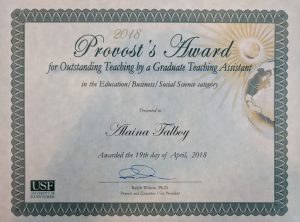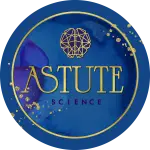

A teaching philosophy is a statement about how you address learning in and out of the classroom. This self-reflective statement requires insight into not only your goals as the instructor of a course, but also the goals you wish to instill in your students. The “self-reflective” part indicates that this statement is not one made on the fly. Instead, it takes time and energy to really think through how you approach learning objectives in the classroom and learning throughout a lifetime.
A teaching philosophy has several core components that are woven together to create a narrative of your beliefs, values, and approaches to education. These components include:
If you’ve never sat down and really thought about your approach to teaching, now is a great time to start! I recommend starting with your personal experience. Pull out a piece of paper or open a notepad and try to answer the following questions: What are the classes you took in your life that you really loved? Who are the educators that come to mind when you think of a great instructor? What did they do that really stuck with you? On balance, what things didn’t you like and want to avoid in your own career? Now think about your own path as an educator. Have you ever had someone thank you for teaching them something new or interesting? Or maybe you changed someone’s mind on a topic you know a lot about? Maybe you just really like to see students smile or watch the lightbulb go off as they start to understand a complicated topic! All of these things can be used to really hone in on what your personal teaching philosophy is.
After you have this list started, you can start to think about the two or three really key points that seem to bubble up from answering all of these questions. Take a stab at summarizing these points into one or two succinct sentences. Don’t worry about getting it right the first time; this is a process. Once you have a couple of sentences going, take the “5-paragraph” writing approach and start to flesh out supporting statements. Expand that by grouping sentences together based on topic. Create a summary sentence for each topic and start organizing your paragraphs. Keep revising and editing until you have a statement that really reflects who you are in and out of the classroom, as an educator, as an expert in your craft, as someone who wants to make a difference in someone else’s future. It will take time but you will get there!
My personal teaching philosophy evolved over time to be one of scientific openness to question and deliberate, as well as applying a considerate mindset to every aspect of life. I firmly believe that critical thinking is a core component of what makes a well-balanced adult who is capable of seeing more than one side of a story, especially during times of great adversity in public sentiment. The teaching philosophy I developed and applied over the last 10 years of educating college students is a living document, constantly being evaluated and updated based on the experiences I’ve had and the feedback I’ve received. By adapting and changing with new evidence, I apply my own teaching philosophy to my personal growth as an expert and educator.
“Science is a way of thinking much more than it is a body of knowledge.” – Carl Sagan

My teaching philosophy is guided by the three central tenets of scientific thinking: question everything (including authority), have a healthy dose of open skepticism (tempered by a willingness to accept evidence), and practice intellectual honesty above all else. In order to develop the ability to think scientifically in all aspects of life, students need to have the opportunity to engage in a variety of activities that not only encourage active learning of psychological principles, but also application of reflective thought to the material being learned.
Before each lecture in my psychology courses, students are instructed to read the assigned chapter and answer a short set of questions to ensure they have a basic understanding of the material. I then use the lecture time to help students develop a sense for how psychological phenomena are isolated for evaluation in research contexts using real research examples and applied activities. Special attention is given toward creating a connection between what we encounter throughout our lifetime and how those experiences can generate research hypotheses, as well as the inverse of how research can inform action in daily life. I believe that these connections are paramount for developing the ability to think critically about the relationship between scientific research and individual experience.
To add depth to the connections made between research and personal experience, I use small group (3-5 students per group) activities to discuss pre-planned questions that connect current events (e.g., new technology, advances in medicine, politics) to the material covered in the textbook and lecture. The use of small groups creates space for an in-depth discussion among peers who bring their own insightful life experiences and unique social backgrounds to the conversation. These types of activities also allow for peer-education, open questioning, and discussion in a setting that permits thoughtful conversation and debate that is not typically possible in large lectures or online courses. Often, I find that these small group activities encourage students to consider opposing views to which they may otherwise remain unexposed. This is especially important when we discuss polarizing topics (e.g., sexism, obedience to authority). Skepticism of what is presented in the textbook and lecture can often be changed in the face of evidence presented via first-hand experience of peers.
Seeing students open their mind to the possibility that another’s experience in life may be fundamentally different from their own is a greatly rewarding aspect of teaching. More than anything, I strive to encourage students to actively reflect on their own beliefs and experiences, considering how those beliefs and experiences may be similar to or different from their peers as well as to the findings in psychological research. Intellectual honesty requires reflecting on parts of the self that one may not be actively aware of, nor like, often making this the hardest tenet to develop. To provide a space for students to complete these self-evaluations honestly, without the fear of peer rejection, I evaluate this aspect of learning through individual activities such as research reports or critical film reviews. These reports are graded anonymously (using student ID instead of names) so students feel comfortable sharing this highly personal aspect of growth and education.
My personal approach to teaching encourages application of scientific thinking across a wide variety of situations throughout not only higher education, but also throughout students’ everyday lives. Science may colloquially be considered a body of knowledge, but the ability to think scientifically can and should transcend the walls of the lecture hall in which it was developed.

Copyright © 2021, Astute Science LLC All Rights Reserved